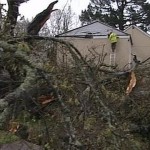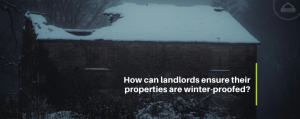Insurance was designed to cover unexpected circumstances. If a tree has fallen and hit your house, your residential landlord property insurance should cover the damage. Check your policy to see how comprehensive your cover is and when buying or renewing your policy, be sure to check it covers key risks and is competitively priced.Are your properties insured for flood damage?Providing you have residential landlord property insurance – and that your tenant has contents insurance – you will be covered for flood damage.If the damage is to something fixed, such as your kitchen, you will be covered by your buildings insurance, if it’s a movable object, such as TV, your tenants will be covered by their contents insurance.It’s worth noting that there is a difference between landlord contents insurance and tenant contents insurance. You should encourage your tenants to take out contents insurance to protect their personal items.If the damage is severe enough to require the tenants to move out temporarily, most residential landlord insurance policies will cover alternative accommodation, loss of rent and public liability costs too.If your tenants are flooded, advise them to turn off the gas, electricity and water at the mains, and tell them not to enter still water if the electricity supply is on. You should contact your insurer at the earliest opportunity and seek advice from them, and always take photos of the damage to show to your insurer too.
When it comes to making a claim, be ready with full details and evidence of the damage when you call the insurer. This will help speed the process along.
Before you make a claim…
It could often be cheaper (not to mention easier and quicker) to pay someone to fix any damage without claiming on your insurance as your premiums could rise as a result of making a claim. It’s worth considering your options.
If you do want to claim for damage via your insurer, contact them before paying for any damage; they may need you to provide evidence before they can pay out for the claim.
You can read the full article here.
To help avoid future weather damage follow these top tips:
Ensure pipes are adequately insulated
Clear gutters and drains and check overflow pipes are connected
Check your tenants have the correct emergency phone number
Cut back low hanging tree branches
If the area is prone to flooding, ensure the tenants have a stock of sandbags
Ensure you have a comprehensive property insurance policy in place
Ask tenants to leave heating on a timer and turn off the water supply if the property is vacated for any period of time
If you would like to discuss further how Abode can help you with your property, then contact us today. Tracy and the team will be delighted to talk to you.








